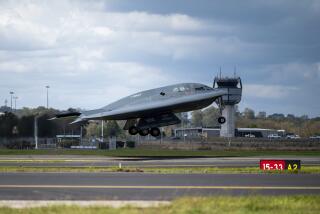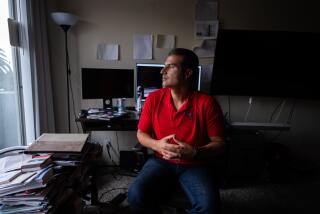Yemen bomb suspect released, lawyer says
Reporting from Sana, Yemen — Yemen authorities on Sunday released a 23-year-old engineering student who had been arrested a day earlier for her alleged connection to Al Qaeda and the foiled plot to mail packages of concealed explosives to the U.S., her lawyer said.
The Yemen government did not issue a statement on why Hanan Samawi, who was detained Saturday after her cellphone number was traced to shipping orders, was freed. The student’s release could be a political embarrassment for President Ali Abdullah Saleh, who had announced her arrest in a high-profile news conference apparently designed to show that his government was moving aggressively against Al Qaeda in the Arabian Peninsula.
Samawi’s lawyer, Abdulraham Barman, said he was told by Samawi’s father Sunday evening that she was no longer in custody. Barman did not elaborate.
A Yemen official in Washington, who asked not to be named, said authorities released Samawi on conditional bail and believed it was a case of stolen identity. The official said “they brought in several people from the shipping company where the package was dropped off. They had them look at the woman and see if they could identify her. All of them said it was not her.”
The official added that the woman who did drop off the package “used a passport and an ID that had the full name of Hanan Samawi, and her address and phone number.... We believe it was someone who knew Hanan Samawi or somehow their paths crossed.”
Hours before the young woman’s release, her classmates at Sana University College of Engineering protested against the treatment she received from police in her neighborhood in north Sana, the capital. Students were angry that police had surrounded her house and drove away with her and her mother, a scene many Yemenis found culturally reprehensible. They protested under the sign: “Is this how you treat women in Yemen?”
In a country woven with deception and conspiracy, the president’s involvement in the case suggested the increasing pressure Saleh faces inside and outside of Yemen. Was he taking charge to keep Washington from pressing him for increased U.S. military intervention, or was it a sign that after years of keeping the Americans at bay he was signaling closer cooperation with the Obama administration?
“I think it’s an orchestration to draw more attention to Yemen,” Barman, a human rights lawyer, said earlier in the day. “The U.S. wants to be more active here, and this plot is a fabrication to justify coming military strikes against Al Qaeda.”
Others viewed the president’s quick action as a pointed message to Washington: “We’ll deal with it to your liking, but just keep out of our hair. The president has the support of the Yemeni people to handle our own affairs,” said Abdul-Ghani Iryani, a political analyst. “The military option will not work in dealing with a small group of bandits. You need police work, not bombs and missiles.”
While pundits and columnists parsed the global politics of terrorism, Yemeni investigators hunted for suspects and details in a plot that spanned several countries. Security forces were trying to determine how two packages containing explosives and bound for Jewish centers in Chicago slipped through detectors at the Yemen airport and wound up on planes in Britain and the United Arab Emirates.
Al Qaeda has not claimed responsibility for the plot, but intelligence officials say it bears the earmarks of Ibrahim Hassan Asiri, the group’s chief bomb maker. The explosive in the packages was PETN, which was also used in a suicide bombing carried out by Asiri’s brother in 2009 in a failed attempt to assassinate Prince Muhammad bin Nayef, the head of Saudi Arabia’s intelligence agency.
Few on the Sana University campus believed that Samawi, a liberal thinker and the daughter of a water engineer, was connected to a terrorist network, even though a copy of her identification card also appeared on shipping papers. Her female classmates, most of whom wore veils covering their faces, described Samawi as an apolitical conscientious computer engineering student awaiting graduation in July.
“Hanan wouldn’t do anything like this,” said a student who gave only her first name, Sumiya. “She’s only interested in computer engineering. She’s one of our best students, a normal girl. She listens to Western music. She likes Yanni.”
There is growing frustration among Yemenis with Washington’s influence and their own government’s inability, despite military attacks on Al Qaeda, to significantly weaken the group. Many believe that the country is adrift in a costly and dangerous battle against terrorism while not solving issues such as poverty, corruption and a failing education system that have allowed militants to gain a foothold.
News clips tend to stay the same. Soldiers and heavy artillery move into mountainous regions, airstrikes rattle ravines and Al Qaeda fighters slip away, disappearing into tribal lands and safe houses. Increased cooperation between the U.S. and Yemen has resulted in some military successes, but, analysts say, a new generation of militants is waiting.
“Right now there’s no indication whatsoever that Al Qaeda is losing ground,” Iryani said. “As tanks roll into an area, new buds of terrorists bloom. We’ve been going about it completely wrong.”
Times staff writer Richard A. Serrano in Washington contributed to this report.
More to Read
Sign up for Essential California
The most important California stories and recommendations in your inbox every morning.
You may occasionally receive promotional content from the Los Angeles Times.











